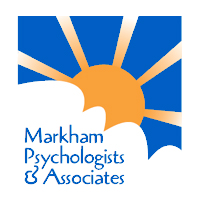
SERVICES

Markham Psychologists & Associates is pleased to provide a range of services to meet the needs of you and your family. Please click on a service area below for a general description of our services. If you have more specific questions, please contact us at (905) 472-9658.
Individual Therapy
Couples Therapy
Family Therapy
Child & Adolescent Therapy
Therapy for Very Young Children (0-6 years)
Psychological Assessments for Adults
Psychological Assessments for Children and Youth
Individual Therapy

People choose individual therapy for a wide variety of reasons. Some may seek help for emotional difficulties, others may have problems functioning in their lives, and still others may need support or guidance through periods of transition or uncertainty. In individual therapy, the therapist and client meet in a confidential, one-on-one environment, with treatment typically being focused on a specific problem (such as anxiety, panic attacks, depression, stress, addiction, or family/ relationship issues). Treatment length depends on a number of factors, including the nature and severity of the problem, the needs of the client, their readiness and ability for change, and the degree to which they actively participate in the process. Sometimes, referrals to adjunct services may also be recommended, if necessary.
Several different kinds of individual therapeutic approaches may be used, two of which are briefly described here. Cognitive Behavioural Therapy focuses on changing ways of thinking, in order to modify feelings and/or behaviour patterns. Emotionally-Focused Therapy centers on feelings, employing techniques to help clients to identify, experience, and process their emotions, in order for healing to occur. Your therapist will discuss with you which approach is recommended for your situation. However, you may request a particular approach.
Therapy is a collaborative effort. Your therapist works alongside you in order to help you through your problem. It is, therefore, important for you to feel comfortable with your therapist. It is also important to remember that individual therapy involves your active participation! The extent to which you are ready for change, and are willing to engage in the various therapeutic tasks (such as reading, writing, disclosing, trying new skills), will affect the degree to which you benefit from therapy.
For more information regarding sessions, please see our Frequently Asked Questions (FAQ) section.
Couples Therapy

You commit to your love relationship/marriage in anticipation that you will enjoy a lifetime of companionship, passion, and commitment. Sometimes, your efforts to develop and maintain a healthy relationship/marriage with your partner/spouse are affected by life circumstances and stressors. The disappointment that follows usually lowers your satisfaction in the relationship, makes it difficult to resolve problems, and can lead to volatile conflict situations. Couples therapy facilitates your efforts to improve your relationship/marriage with your partner/spouse.
Psychologists who practice couples therapy are specialized in understanding how relationship patterns emerge and how these patterns are maintained in relationships leading to increased distress for both partners/spouses. Evidence-based therapeutic approaches are utilized to ensure that a safe and reassuring therapeutic relationship is developed with each partner/spouse.
Your couples therapist will meet with you and your partner/spouse. The therapeutic focus is on increasing your awareness about your own as well as your partner’s feelings, thoughts, and interactions, and how these patterns affect your relationship. Couples therapy is aimed at changing these negative patterns; the therapist helps you identify and overcome roadblocks to change in order to foster a fulfilling relationship. The goal of couples therapy is to reduce your level of distress, increase your sense of self-worth, increase your sense of connectedness with your partner/spouse, and restore your motivation to pursue your life goals.
The couple therapists at Markham Psychologists understand the complexities associated with issues of difference, diversity, and cultural identity and we are committed to working with couples with diverse backgrounds (sexual orientation, culture, ethnicity, religion, etc.).
Couples may request couples therapy if they want to improve a healthy relationship, if they want to increase their level of satisfaction in the relationship, if they are unable to resolve problems in the relationship, or if they find themselves in volatile conflict situations.
Family Therapy

Most people seek family therapy when the presenting issue affects the entire family, such as a divorce, death of a family member, or conflict that the family has tried to resolve unsuccessfully. However, family therapy can also be of benefit in situations that may not at first appear to be a family issue. For example, if one member of the family has a psychological or emotional issue, other members may benefit from support, education about what to expect, and what factors may facilitate the affected individual’s recovery. Furthermore, there may be patterns of interaction within the family that are contributing to or maintaining the problem. Family members may not be aware of these patterns or may need assistance in changing the way they interact. Through family therapy members can better understand their role in the family, learn to communicate more effectively and learn conflict resolution and problem solving skills.
While family therapy usually involves members of the nuclear family, members of the extended family may be included if their involvement could facilitate resolution of the problem or they are being affected by the problem. The composition of therapy sessions can vary from week to week and it is not always necessary to include all members of the family. Where appropriate, children may be included.
Child & Adolescent Therapy

It is common for parents to be concerned about their children’s emotional and behavioural development. Children may exhibit emotional or behavioural problems for a variety of reasons, resulting from stressors related to the child’s specific phase of development, or related to their environment (such as changes at home or school) or due to the presence of a longer-term condition (such as Attention Deficit Hyperactivity Disorder). Most parents at one time or another, have to deal with their child or adolescent’s displays of anger, sadness, worries, temper-tantrums, non-compliance or difficulty with a sibling or peer. When such problems exceed parents’ knowledge or capabilities, or when the problems begin to adversely affect performance in such areas as school, personal adjustment, social or family relationships, then professional treatment and intervention such as that offered at Markham Psychologists can be sought. Early identification and intervention for children and adolescents displaying emotional or behavioural difficulties is essential to reduce the negative effects on academic and social adjustment. At Markham Psychologists we are committed to providing effective services that address the mental health needs of children and adolescents.
Treatment services provided at Markham Psychologists for children and adolescents typically involve several steps including:
Initial Assessment: clarifying behaviours or concerns; obtaining appropriate consents for gathering relevant information about the child/adolescent from a variety of sources across various settings; when appropriate, completion of rating scales and behaviour checklists by the child, parents and/or school personnel; identifying strengths and resources; and exploring such factors as the history, intensity, pervasiveness and persistence of the difficulties of concern.
Assimilating all of the relevant information to create a comprehensive picture of concerns.
Formulating a treatment plan based on the assessment and presenting problems to include short and long term goals and strategies for intervention.
Therapeutic intervention sessions
Evaluating the effectiveness of treatment and reformulating the plan when necessary.
Since emotional and behavioural difficulties often have multidimensional influences, treatment interventions for children and adolescents must be multifaceted and comprehensive. This means that interventions may include working not only with the child/adolescent, but also with parents and school personnel. Therapeutic approaches are tailored to the needs of the individual child/adolescent, and include utilization of ‘up-to date’ procedures that are recognized as being most effective. Therapeutic approaches can vary from more “hands-on”, activity-based types of approaches for younger children, to more “talking-based”, self-instruction, problem-solving, types of approaches with older children and adolescents. Some children may benefit from play therapy as a means to express, explore, and resolve their inner feelings and struggles. Regardless of the specific procedures utilized, treatment is an interactive, very personal process that builds upon the relationship established with the child/adolescent and the particular clinician at Markham Psychologists.
Useful Resources To Learn More About Children and Adolescent Mental Health:
www.kidshealth.org
www.interventioncentral.org
www.allkindsofminds.org
Therapy for Very Young Children (0-6 years)

Because very young children do not yet have the sophisticated language in expressing themselves, their feelings are often expressed as sleeping and feeding difficulties and temper tantrums. Although these phenomena are part of typical development, some parents notice that they occur at a significantly higher frequency and intensity, which cause distress to the child as well as the family. At Markham Psychologists, we provide parent counseling and child-led psychotherapy to support and facilitate the self-development of the child and the bonding process between the parents and their very young children. The empirically supported child-led approach allows the very young child, together with the parent, to work through relational, behavioral, and developmental struggles through play. The goal is to promote the parents’ understanding of their young child and enhance the parent-child communication at a developmentally meaningful manner.
Treatment services typically involve the following steps:
Initial Consultation: to assess the presenting problems through interviews with the family and observation of the child. One of the objectives is to rule out other possible medical and developmental causes to the observed difficulties.
Feedback Session: to discuss the formulation and recommendations with the family.
Intervention Sessions: to engage in the contracted treatment plan and ongoing evaluation of the therapeutic progress.
Psychological Assessment for Adults

A psychological assessment provides important information about an individual’s social, emotional, behavioural, and/or cognitive functioning. It encompasses clinical interview/s, testing, scoring, analysis, interpretation, report writing, recommendations, and feedback. The information is presented in a written psychological report, which is discussed with the client at a feedback session.
Several practitioners within the practice currently provide Psychological Assessment. Details of the process may be found by clicking on the practitioner’s name.
A psychodiagnostic assessment involves an investigation of social and emotional functioning and usually includes online or in person testing. This assessment may result in a Psychological Diagnosis. It may or may not include a report depending on the needs of the client.
Provided by:
Dr. Queenie Lo
Dr. Vasanthi Valoo
Dr. Tammy Morrell-Bellai
Dr. Cheryl Pohlman
A comprehensive cognitive/psychoeducational assessment involves an investigation of intellectual abilities, academic skills, memory, attention, executive functioning, as well as social/emotional functioning.
Provided by:
Dr. Queenie Lo
Dr. Vasanthi Valoo
An ADHD assessment involves an investigation of attention abilities and may include an investigation of intellectual abilities, academic skills, memory, and executive functioning.
Provided by:
Dr. Queenie Lo
Dr. Vasanthi Valoo
** A psychodiagnostic assessment does not encompass in-person testing.
Psychological Assessments for Children and Youth

Sometimes parents and teachers worry that a child/adolescent is not making progress in school and they wonder if the child/adolescent has a “learning disability.” A learning disability “results from impairment in one or more psychological processes related to learning, in combination with otherwise average abilities essential for thinking and reasoning. Learning disabilities are specific, not global impairments, and as such are distinct from intellectual disabilities” (LDAO).
A psychological assessment that includes psychological and cognitive testing can only be conducted by a Psychologist (doctoral level degree ) or Psychological Associate (master’s level degree) who is registered with the College of Psychologists of Ontario and who does not have a restriction on his or her certificate of registration. A psychometrist under the supervision of a registered psychologist may also complete the psychological testing.
The method by which psychologists diagnose a learning disability is through a psychological assessment. A psychological assessment usually involves the gathering and integration of background information about the child/adolescent and the administration of psychological and educational tests. The procedure generally includes assessment of a variety of skills which are considered necessary or important for success at school, including learning (cognitive) abilities, academic achievement, visual-spatial skills, memory and/or social-emotional/behavioural adjustment including attentional difficulties. The Psychologist or Psychological Associate uses tests and other information such as personal and medical history, description of current symptoms and problems and collateral information from the school and other persons involved in the child/adolescent’s care.
The purpose of a psychological assessment is to provide the family and school with a formulation of the learning difficulties, whether or not there is a learning disability present, other factors that may be impacting on academic functioning (i.e., socio-emotional factors) and to provide recommendations for accommodations and modification that can be used to help the child/adolescent progress according to his/her abilities. There may also be recommendations for accessing resources in the community
Parental consent for a psychological assessment is required for those under the age of 16. Those adolescents 16 and over can give their own consent. Privacy of information is protected except where there are limits to confidentiality (i.e., self harm, harm to others). At the conclusion of the assessment process, the parent will be invited to come to meet with the Psychologist/Psychological Associate so that the assessment results may be explained in detail and so that the parent will have an opportunity to ask any questions that they may have at that time.
The assessment process generally takes approximately 10 hours including the initial intake interview, 2 morning assessment sessions, a feedback session to discuss the results. As every child/adolescent is different in their abilities and complexities, some children/adolescents may have more sessions.
Our fees are competitive for a complete psychological assessment including a feedback session with the psychologist and a comprehensive written report. Partial costs may be covered through a family’s extended health benefit plans.
Rehabilitation

Useful Links:
Ontario Brain Injury Association https://obia.ca
Toronto ABI Network https://abinetwork.ca
